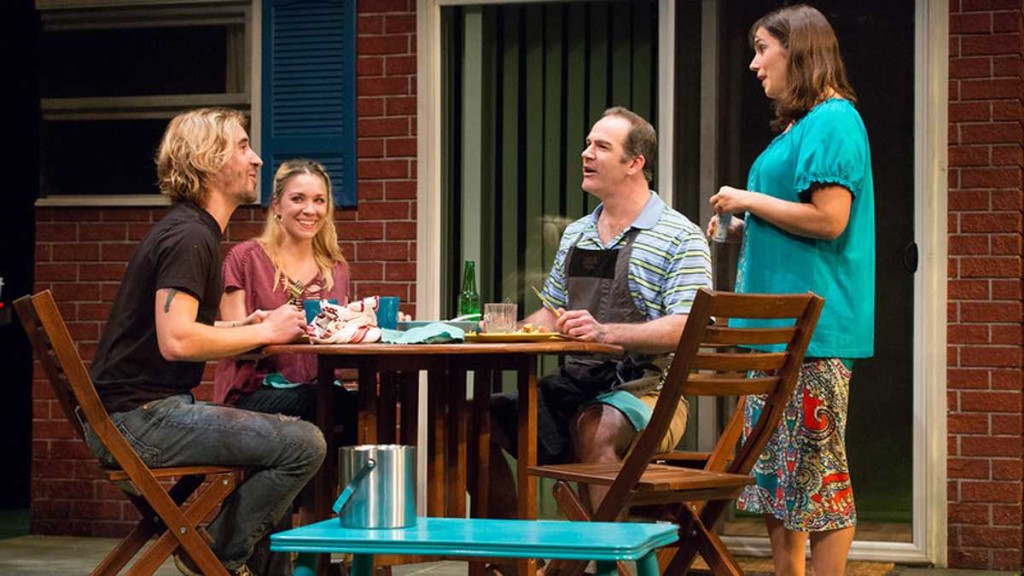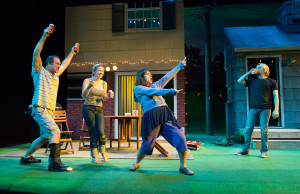
“Cities and thrones and powers/ Stand in time’s eye,/ Almost as long as flowers,/ Which daily die:/ But, as new buds put forth/ To glad new men,/ Out of the spent and unconsidered Earth/ The cities rise again.”
—Rudyard Kipling
By naming her play DETROIT, that byword for the fall of the American Empire and the death of the American Dream, Lisa D’Amour makes clear her lofty aims: Setting the play not in the decay of urban Detroit but in a nameless American suburb, she wants her characters to represent the nation’s malaise in the wake of the Great Recession. Other works have explored the failures of suburban life with more success: in film, Sam Mendes’s Oscar-sweeping American Beauty (1999); in literature, Richard Yates’s brilliantly unforgiving Revolutionary Road (1961). Still, Lisa D’Amour seems to have created a realistic-yet-impressionistic look at the downfall of the American middle class. I say “seems to” because Philadelphia Theater Company’s infuriating production masks the naturalism of the dialog and much of the humor, making judgments on D’Amour’s Pulitzer-shortlisted work decidedly difficult.
The play’s action is confined to two backyards in a Levittownesque development. Ben (Steven Rishard) and Mary (Genevieve Perrier) are a conventional suburban couple who have recently hit some hurdles on their path to middle class bliss (if you want a happy ending, try A). Recovering addicts Kenny (Matteo K. Scammell) and Sharon (K.O. DelMarcelle) move next door, challenging Ben and Mary’s assumptions and worldview. “You’re living in a tiny spectrum,” Sharon tells Mary. “Like this small. And do you know how big the spectrum really is Mary? Do you know?”

D’Amour’s script is full of broken sentences, overstepping lines, and non sequitors—like real conversations. Not all of the author’s devices work. Sharon’s searches for the right word are things we all do, but feel forced—D’Amour wants her to be a too-unintelligent wise-fool. But director Maria Mileaf does the playwright no favors, allowing pauses and tones that make it seem as if her actors have never engaged in a real-life conversation. There is a natural humor and strangeness in the script which Mileaf masks with attempts at broad laughs and stylized performances.
Each of the actors has performed excellently elsewhere: Scammell was superbly peculiar in New Paradise Laboratories Fringe highlight The Adults and was part of the great Wilma production Our Class. Perrier was similarly miscast as a working class girlfriend in PTC’s reasons to be pretty, but blossomed in the company’s Seminar and other shows, including Lantern Theater’s Private Lives and EgoPo’s Lady from the Sea. DelMarcelle was a fine supporting member of that same EgoPo show and Lantern’s Emma, and had a fun turn in Iron Age’s recent The Toughest Boy in Philadelphia.
I say this because they are so thoroughly misused for much of DETROIT. Among the foursome only Rishard shines with an understated faux-confidence riddled by veins of desperation.
A fifth character, houseowner Frank (Tom McCarthy) only appears in the denouement. By that time, Mileaf’s production has somewhat redeemed itself with an affecting final third. The plot has seen a series of mishaps—a broken umbrella, hospitalizing injuries, broken chairs—and frequent recollections of characters’ dreams. A long dreamlike backyard bacchanal ties the mysteries and themes together into a fiery and resonant climax.
DETROIT is an elegy to the loss of middle class hope and to the lost idea of community and neighborhood. But like the real world city of Detroit, the characters are prepared to rise from the ashes of justified desperation, to put forth new buds from the spent and unconsidered earth. [Suzanne Roberts Theatre, 480 S. Broad Street] October 10-November 9, 2014; philadelphiatheatrecompany.org.
